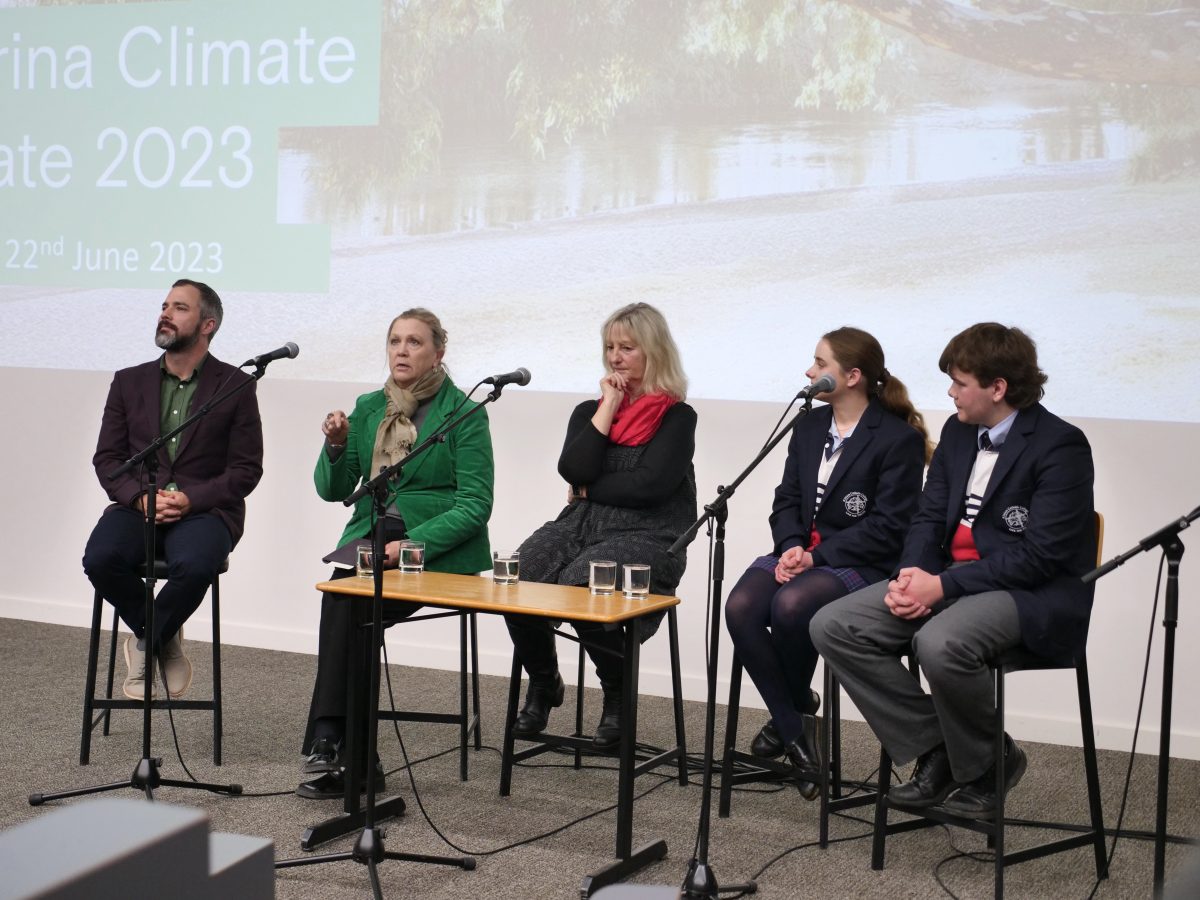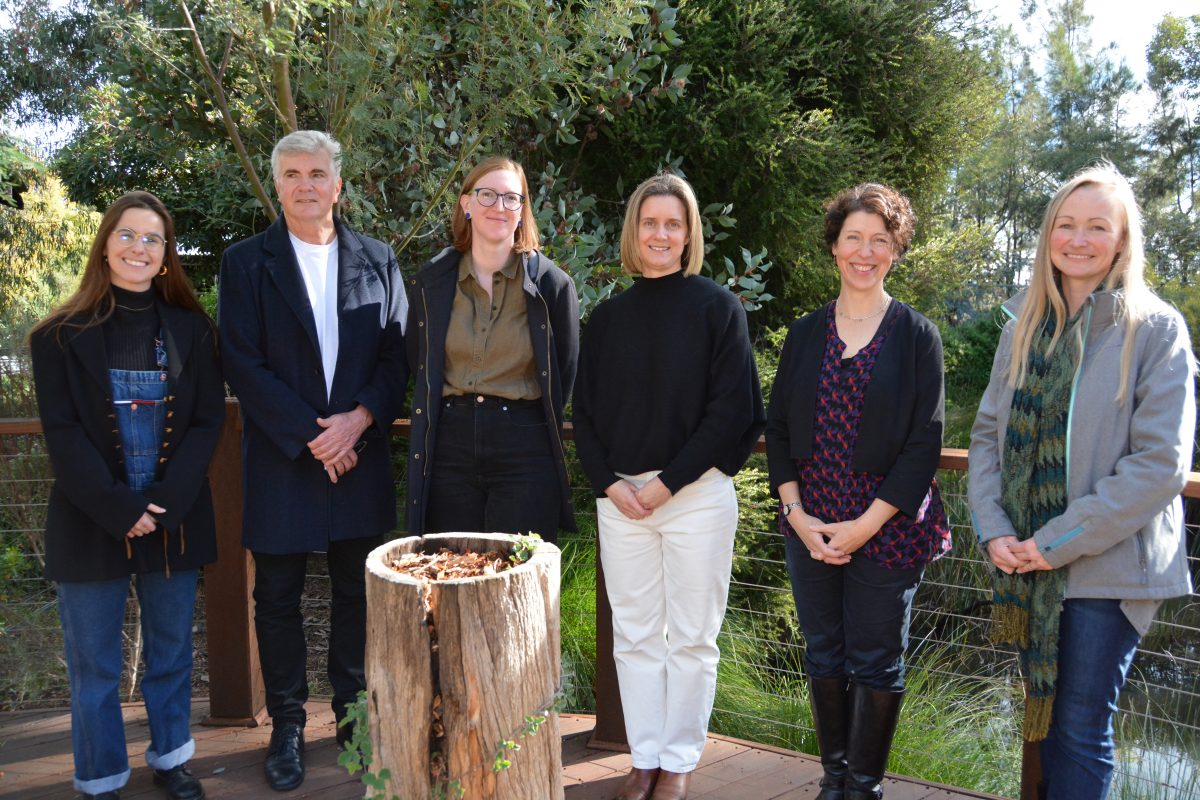
Charles Sturt University Professor Dale Nimmo, Murrumbidgee Landcare chair Gemma Purcell, Wagga City Council deputy mayor Jenny McKinnon and Kildare Catholic College students at the Riverina Climate Update 2023 at Charles Sturt University. Photo: Mayfly Media/Steven Moore.
Wagga’s Charles Sturt University (CSU) has hosted the first instalment of a series of national climate events focused on how regions are impacted by a changing climate and examining local solutions.
Riverina Climate Update 2023 was led by ANU Institute for Climate, Energy and Disaster Solutions (ICEDS) at CSU. It featured policymakers, industry leaders, school students and expert members of the community.
The event was triggered by Kildare Catholic College geography teacher Sharon Forwood when she contacted ICEDS about a short climate course for her students. She said the students were the motivation to email ICEDS as they were upset about climate change and the recurring disasters.
Ms Forwood said the event was positive for the community, and the region was fortunate to have people of high calibre attend and provide much-needed information.
Ms Forwood said her students spoke passionately and honestly about their fears and anxieties.
“They spoke about what it’s like growing up, wondering if they’re going to see the colours of the [Great] Barrier Reef or if they can bring children into the world and more,” Ms Forwood said. “These are the questions we get asked in the classroom.
“It was empowering for them to see people and decision-makers talking about it engaged in conversation. It helps them feel less isolated.
ICEDS’ director and vice chair of the Intergovernmental Panel on Climate Change (IPCC), Professor Mark Howden, said the first regional event was “fabulous” and that engaging with people in regional communities was crucial.
“People in the regions are the hardest hit in many ways by climate change,” Professor Howden said.
“There’s some degree of climate denialism or lack of understanding of climate change in the regions, which differs from that in the cities.”
Professor Howden said there were many ways to improve Riverina’s climate sustainability, including constructing buildings suitable for the current and future climate.
“Buildings that can handle cold and hot extremes more effectively with a much lower greenhouse gas footprint,” he said.
“Moving away from gas to heat our buildings into heat pumps which costs less to run.
“If done well, we can essentially have smoke-proof buildings … we’ve got refuges with clean air rather than our current building stock, which is often leaky, and we end up with dirty air inside our buildings.”

Madison Kuras (Australian Museum), ANU Professor Mark Howden, ANU Dr Rebecca Colvin, Kildare Catholic College teacher Sharon Forwood, Jenny Newell from the Australian Museum, and Tanja Russell from ANU at ErinEarth. Photo: Kildare Catholic College.
Professor Howden said Wagga City Council’s development of a community roadmap towards net zero was a positive and systematic approach to reducing greenhouse gas emissions and bringing other benefits to the people of Wagga.
ICEDS’ director said it was important to get a youth voice in climate discussions because the decisions made now would impact the young people and those who weren’t born yet.
“In many cases, they don’t have a voice, and they’re the ones who are going to suffer the consequences if we do things badly,” Professor Howden said.
“[A] recent IPCC report showed those children born across the globe today will, on average, experience three to four times more extreme weather than their grandparents did.
“Their grandparents’ era experienced disruption once or twice, which was manageable. But the disruption will become a semi-regular event for the children today and tomorrow, which means stumbling from disaster to disaster,” he said.
Wagga Wagga City Council deputy mayor Jenny McKinnon said it was an honour for the city to hold the climate event.
Ms McKinnon said the biggest takeaway from the night was how interested the local community was in issues of global warming and climate change and how much people wanted to be involved in finding solutions to sustainable change.
CSU manager of sustainability Edward Maher said the university was thrilled to be a partner and host the event for the region.
“It aligns with CSU’s values and our purpose as an organisation. We’re a certified carbon-neutral organisation, and we’re trying to lead by example, learn from others and share what we’ve learned on our journey,” Mr Maher said.
“It’s critical to reach out to the wider community and initiate and support conversations around what positive actions we can take not just within the boundaries of the university but right across the community.”
Mr Maher thanked ANU ICEDS, Kildare Catholic College, and Wagga Wagga City Council for making the event a success.







